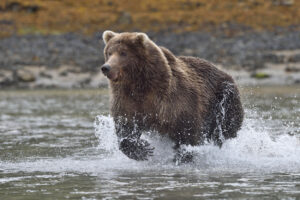
BEAR DREAMS
By Mark Munger
(Note: This piece was originally written for Montana Public Radio’s program, Reflections West (RW). RW paired a contemporary writer’s thoughts with a piece of classic poetry or literature. Sadly, while accepted for production, the show went off the air before “Bear Dreams” was broadcast.)
I’ve lived my entire life in the place the Dakota named Mnisota: “land reflecting the sky”. Most folks know that the Mississippi River begins here. But my home state is actually named after a lesser-known stream; the cloudy, muddy Minnesota River.
Rivers are a reality of this place. In addition to being “The Land of 10,000 Lakes”, Minnesota is a wellspring for watercourses flowing beneath every gravel road, two-lane, and freeway crisscrossing the state. Minnesota is also soggy with marshes, swamps, and bogs; natural filters from whence rivers, steams, and creeks are born. Unlike the West, where mountain snowfall dictates whether folks have potable water at their taps, Minnesota is eternally hydrous and does not suffer, as Wallace Stegner observed, from the perpetual aridity that plagues the American West.
One attribute that Minnesota does share with the West is piney forest—though beyond the Boundary Waters Canoe Area, Minnesota has few places untouched by tourists, fishing boats, or snowmobiles. Even so, my “neck of the woods” has healthy populations of wolves, black bears, fisher, lynx, coyotes, and bobcats. What we do not have are grizzly bears. Recent reports of grizzlies migrating from the Rockies onto the Great Plains, seeking sustenance within their historic range, a range that once included the cottonwood groves of western Minnesota, are intriguing. But while dreams of grizzlies repopulating the Minnesota River Valley present a romantic notion, the inevitable bear versus human conflicts inherent in such repatriation cause me pause.
Munger pairs his essay with an excerpt from Saskatchewan author Guy Vanderhaeghe’s novel, The Last Crossing, selecting a scene that depicts a confrontation between English adventurer, Addington Gaunt, and a mother grizzly bear. Munger’s selection contrasts notions of historical wilderness with the reality of reintegrating apex predators into 21st century America.
Addington lifts his eyes and there is the grizzly. Powerful haunches, long hair like the quills of a porcupine that tremble as the bear rises from a carcass to stand on its hind legs with a startled, “Whuff!”
Addington takes two decisive steps to the right to present himself with a lung shot. The bear swings its dished face, its bloody muzzle towards him. Addington draws the bow, feels the fletching touch his cheek, looses the arrow. It hisses, gives a sharp click as it nicks a twig, and deflects deep into the shoulder of the grizzly. The bear grunts with surprise, bites at the shaft. It snaps in the grizzly’s jaws. Addington draws a second arrow and nocks it.
The grizzly charges, a roaring, quivering, rolling wave of fur and muscle. Addington’s head fills with the storm, the crackle of breaking branches, the yellow leaves spiraling down in a whirlwind. He fires blindly into the golden tornado.
And the bear rears, saliva drizzling from its jaws, red mouth yawning…(Addington) turns, stumbles for the river, steps into the air, plummets down the slope. A flap of bloody skin dangles in his eyes. He leaps into the water.
(© 2002 G & M Vanderhaeghe Productions. Excerpted from The Last Crossing by Guy Vanderhaeghe. McClleand and Stewart. ISBN 0-7710-8738-1.)


